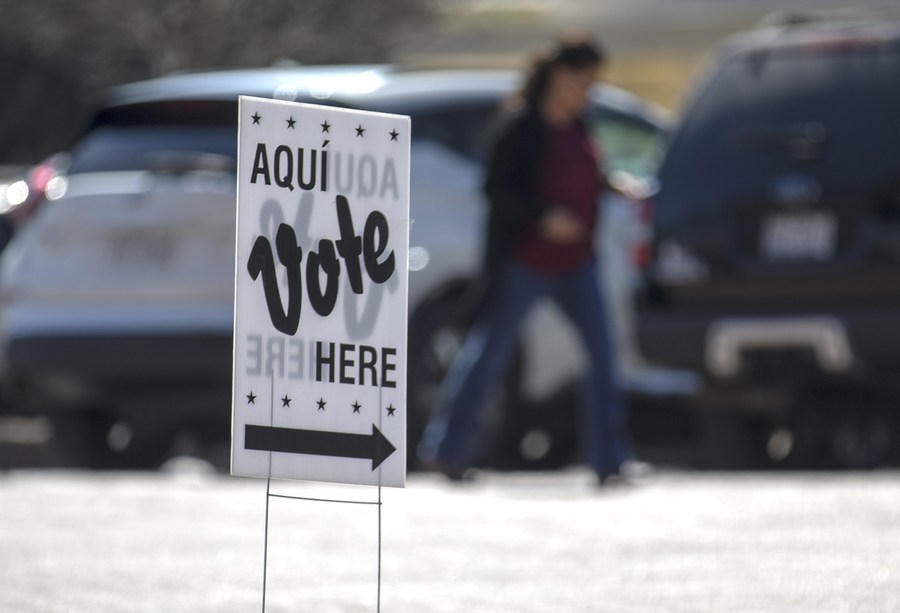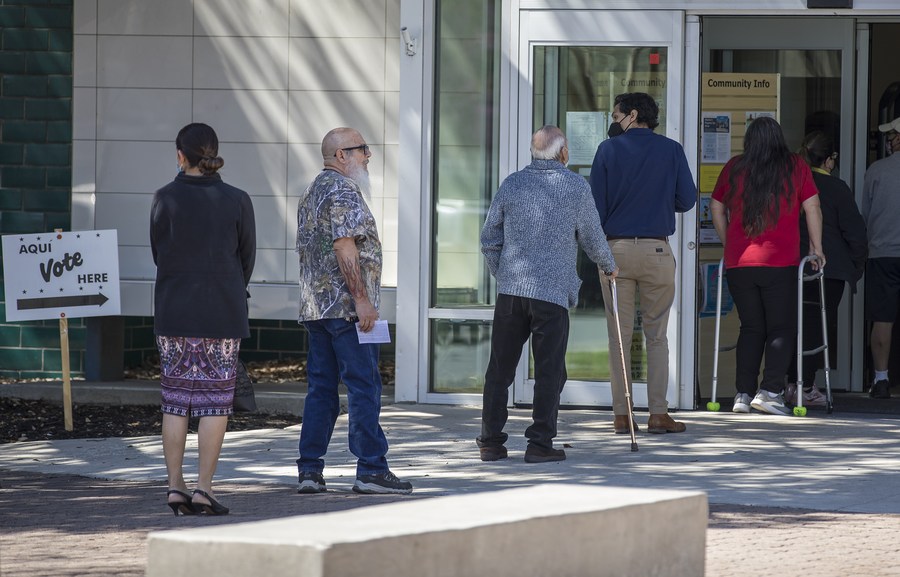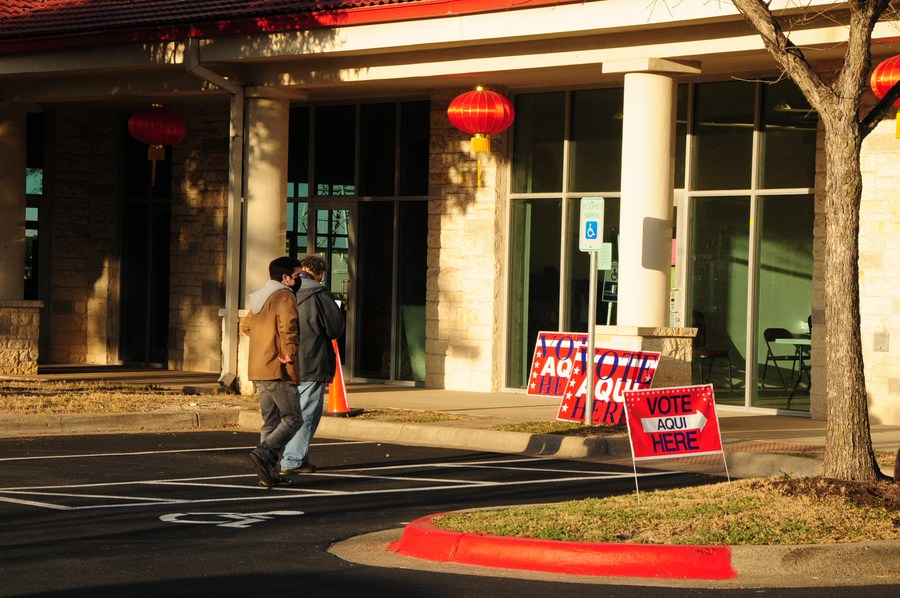Voters head to polls in Texas, kicking off 1st 2022 U.S. midterm primary

A woman walks to a polling station to cast her ballot in the Texas 2022 primary election in San Antonio, Texas, the United States, on March 1, 2022. (Photo by Nick Wagner/Xinhua)
During the primary campaign, Republican and Democratic candidates in Texas have spent more time talking about the economy, pandemic, power grid, immigration, schools and health care, local analysts observe.
HOUSTON, March 1 (Xinhua) -- Voters across the second most populous U.S. state of Texas are heading to the polls on Tuesday, kicking off the first primary of the country's 2022 midterm election season.
It's also the first statewide election in which voters will cast their ballots following the redistricting based on the results of the 2020 national census, as well as the first statewide election after Texas enacted its controversial voting law.
Governor Greg Abbott, 64, facing seven other Republicans, is seeking a third term.
On the Democratic ticket, Beto O'Rourke, a 49-year-old former U.S. Senate nominee and presidential candidate, is the best known and challenged by four other Democrats.
"I think the one big race here in Texas is going to be for governor. That is a huge race because it is very political, red, blue, it's time for change," Michael Martinez, a San Antonio voter, told Xinhua.

Voters wait in line to cast their ballots in the Texas 2022 primary election in San Antonio, Texas, the United States, on March 1, 2022. (Photo by Nick Wagner/Xinhua)
"This is stage one of what will be a tremendous battle as we go forward to November 8," Abbott said in a campaign speech in El Paso last week, touting the state's economy under his leadership while slamming O'Rourke on his climate change positions, catering to the fossil fuels industry seen as the state's lifeline.
It is "a real struggle just to stay alive" in Texas under the all-Republican leadership, O'Rourke claimed during his weeks-long run, blasting the governor for the failures of the state energy grid last winter, which claimed at least 246 lives and resulted in huge economic damage in the state. Democrats haven't won a statewide election since 1994.
During the primary campaign, Republican and Democratic candidates in Texas have spent more time talking about the economy, pandemic, power grid, immigration, schools and health care, local analysts observe. The abortion issue so far haven't taken center stage.
"Hot topic for me would have to be education. As a former teacher, retired teacher, I always look to see how they're talking about education so that would be the hot button topic for me," Rosalinda Casillas, 63, told Xinhua at a polling place in San Antonio.
Brianna Menard, a college student living in Austin, the capital city of Texas, told Xinhua that in her view, voter suppression "is the number one concern right now" after the state's new voting law took effect in December.
Texas is one of 18 U.S. states that passed more restrictive voting laws after the 2020 presidential election. According to a National Public Radio report on Sunday, only in Harris County, home to Houston and the state's most populous county, 40 percent of mail-in ballot applications prior were flagged for rejection.

Voters arrive at a polling station for the Texas 2022 primary election in Austin, Texas, the United States, on March 1, 2022. (Photo by Bo Lee/Xinhua)
However, most Texans just skip the primary elections, said a report in The Texas Tribune on Friday, citing the seemingly low turn-out and the Republican-led redistricting following the 2020 national census.
"The political maps rig most of the districts in the congressional delegation, state House and Senate and State Board of Education so that only a Democrat or only a Republican can win. Few are competitive," said the report.
Three percent of Texans will decide who governs the other 97 percent, the report claimed, noting that a candidate could have won a Republican nomination for the governor race with support from 2.1 percent of voters while a Democrat would have needed just 1.5 percent.
Data from the Texas secretary of state show that 17.1 million Texans are registered to vote but there are 29.1 million Texans and out of them, 21.7 million are 18 years old or older.
The state's races for major state positions also include lieutenant governor, state attorney general and some others. Texan voters will also choose each party's candidates to face off in November for district-based congressional and legislative offices, which will offer clues about where the country's midterm cycle is headed, local analysts said.
According to local media reports, Texas is an open primary state, which means voters in the state don't register as members of a particular political party. Instead, they can cast a ballot in either party's primary election, though not both.
Photos
Related Stories
- U.S. abuse of force, sanctions violates human rights in other countries: report
- People pay heavy price for U.S. manipulation of epidemic prevention and control: report
- U.S. fake democracy tramples on political rights: report
- U.S. indulging in racial discrimination exacerbates social injustice: report
- U.S. entrenched violent thinking threatens lives: report
Copyright © 2022 People's Daily Online. All Rights Reserved.










